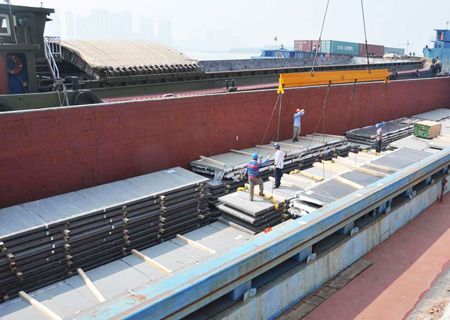News Center

Steel offers several advantages in shipbuilding, which have contributed to its enduring use in the industry. Some key advantages of steel in shipbuilding include:
Strength and Durability: Steel is known for its exceptional strength and durability, making it an ideal material for constructing ships. It can withstand the harsh operating conditions at sea, including extreme weather, waves, and corrosive elements. Steel's high tensile strength allows ships to maintain structural integrity and withstand heavy loads.
Structural Integrity and Safety: Steel provides excellent structural integrity, ensuring the safety of the ship and its occupants. Ships constructed with steel are capable of withstanding the dynamic forces encountered during navigation, including waves, impacts, and vibrations. The inherent toughness of steel enhances the safety of the vessel, reducing the risk of structural failure or collapse.
Design Flexibility: Steel offers design flexibility, allowing shipbuilders to create vessels of various shapes, sizes, and configurations. The versatility of steel facilitates the construction of complex ship structures, optimizing cargo capacity and accommodating specific operational requirements. This flexibility extends to modifications and retrofits throughout the ship's lifecycle.
Weldability: Steel possesses excellent weldability, enabling efficient and reliable joining of structural components. Welded connections provide strength and integrity, contributing to the overall stability of the vessel. Steel's weldability also simplifies repair and maintenance processes, offering cost-effective solutions for addressing any damage or wear over time.
Corrosion Resistance: Steel used in shipbuilding is typically coated or treated to enhance its corrosion resistance properties. Various protective coatings, such as anti-corrosion paint systems or galvanizing, help shield the steel from the corrosive effects of saltwater and exposure to marine environments. These measures extend the lifespan of the ship's structure and minimize maintenance requirements.
Availability and Standardization: Steel is widely available and standardized, making it a preferred material for shipbuilding. Shipyards and manufacturers can easily source steel from multiple suppliers and rely on established specifications and standards. The availability of steel ensures a consistent supply chain, facilitating efficient construction processes and reducing project timelines.
Cost-Effectiveness: Steel offers a cost-effective solution for shipbuilding due to its availability, efficiency in fabrication, and ease of maintenance. The long lifespan and durability of steel structures reduce the need for frequent replacements or major repairs, resulting in lower life-cycle costs for ship owners and operators.
Recycling and Sustainability: Steel is highly recyclable, contributing to the sustainability aspect of shipbuilding. At the end of a ship's life, steel components can be recycled and repurposed, minimizing environmental impact and waste. The recycling process also helps conserve resources and reduces energy consumption compared to producing new steel.
In summary, the advantages of steel in shipbuilding encompass its strength, durability, structural integrity, design flexibility, weldability, corrosion resistance, availability, cost-effectiveness, and recyclability. These qualities make steel an ideal material choice for constructing safe, reliable, and efficient vessels that can withstand the demanding conditions of the maritime industry.
GB T 5312 Carbon and carbon-manganese steel seamless steel tubes and pipes are mainly for ship use, also known as shipbuilding steel pipes. Under GB T 5312, there are mainly 5 steel grades: grade 320, 360, 410, 460 and 490. Each grade covers three levels: I, II, III.
Angle steel, commonly known as angle iron, is a long strip of steel whose sides are perpendicular to each other. There are equal angle steels and unequal angle steels. The two sides of equal angle steel are equal in width. The unequal angle steel is also known as L shape profile steel.
Flat bar steel can be produced according to the user's needs, with fixed thickness, width and length. It can reduce the cutting process for users, reduce the consumption of labor and materials, and also reduce the processing loss of raw materials.
Bulb flat steel for shipbuilding
The bulb flat steel is a kind of medium section material which is mainly used in the field of shipbuilding and bridge building, and the shipbuilding bulb flat steel is an auxiliary medium section material for shipbuilding.
The steel for shipbuilding and oil platform---FH40, is the high tensile strength steel.The shipbuilding steel FH40 is the Hull structural steel.We can provide FH40 shipbuilding steel plate price.
The steel for shipbuilding and oil platform---EH40, is the high tensile strength steel.The shipbuilding steel EH40 is the Hull structural steel.We can provide EH40 shipbuilding steel plate price.
If you are interested in our company or products, welcome to visit our company or local offices; you can also get contact with us through online consulting, demand table submission, e-mails and telephones. Our staff shall wholeheartedly provide product information, application knowledge and good service for you.





 BBN SHIP STEEL FACTORY
BBN SHIP STEEL FACTORY